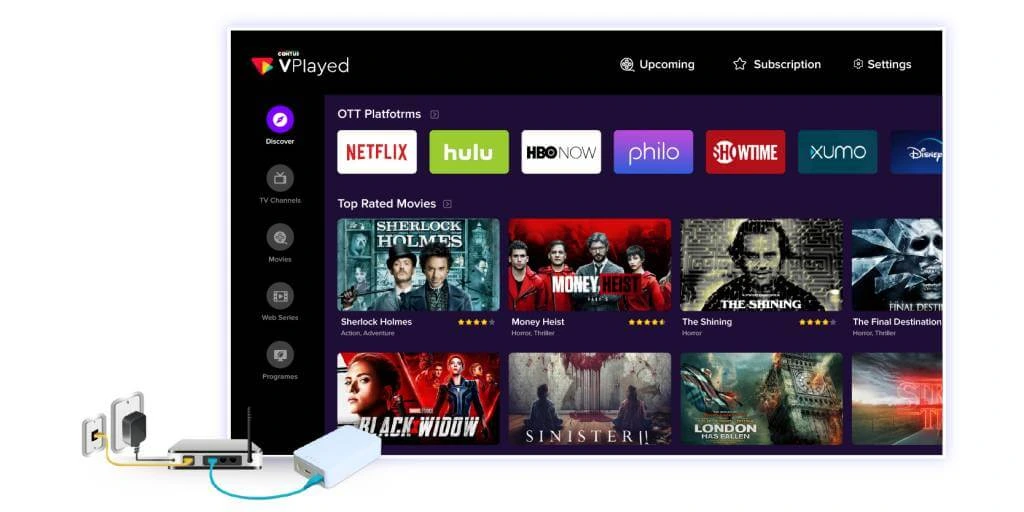
IPTV Trends, Unlocking the Full Potential of IPTV : How Using a VPN Enhances Your Streaming Experience
Introduction to IPTV and VPN
In the modern age of streaming, the combination of IPTV (Internet Protocol Television) and VPN (Virtual Private Network) has become increasingly popular. But what exactly are these technologies, and why are they a match made in heaven?
IPTV refers to the delivery of television content over the internet, as opposed to traditional satellite or cable formats. This allows users to stream live TV and on-demand content using their internet connection.
VPN is a technology that creates a secure and private connection over the internet, encrypting your data and masking your IP address. This ensures your online activities are kept private and secure.
Combining IPTV Trends with VPN offers a plethora of benefits, enhancing your streaming experience while ensuring privacy and security.
Benefits of Using IPTV
Access to a Wide Range of Channels
IPTV provides access to a vast array of channels from around the world. Whether you’re looking for international news, sports, or entertainment, IPTV has it all.
Cost-Effective Solution
Traditional cable and satellite TV subscriptions can be expensive. IPTV services often offer more competitive pricing, giving you access to hundreds of channels at a fraction of the cost.
High-Quality Streaming
With a stable internet connection, IPTV delivers high-quality streaming, offering HD and even 4K resolution for an optimal viewing experience.
Benefits of Using a VPN
Enhanced Privacy and Security
A VPN encrypts your internet connection, protecting your personal data from hackers, ISPs, and other prying eyes. This ensures your online activities remain private.
Access to Geo-Restricted Content
Many IPTV services restrict content based on your geographical location. A VPN allows you to bypass these restrictions by masking your IP address and making it appear as though you are accessing the internet from a different location.
Anonymity Online
By masking your IP address, a VPN provides a layer of anonymity, making it difficult for websites and services to track your online activities.
How IPTV Works
IPTV Technology Explained
IPTV uses internet protocols to deliver television content. This content is streamed from servers to your device in real-time, eliminating the need for traditional broadcast methods. Keeping up with IPTV trends can provide insights into how this technology continues to evolve and improve.
Types of IPTV Services
- Live IPTV: Streams live TV broadcasts as they happen.
- Video on Demand (VoD): Offers a library of videos that can be watched at any time.
- Time-Shifted IPTV: Allows users to watch previously aired content.
How VPN Works
VPN Technology Explained
A VPN creates a secure tunnel between your device and the internet. This tunnel encrypts your data, ensuring it cannot be intercepted or accessed by unauthorized parties.
Types of VPN Protocols
- OpenVPN: Known for its strong security and flexibility.
- PPTP: Offers faster speeds but with weaker security.
- L2TP/IPsec: Balances speed and security, commonly used for secure connections.
Why Use a VPN with IPTV Trends ?
Bypassing Geo-Restrictions
Many IPTV services restrict access based on location. Using a VPN allows you to connect to servers in different countries, bypassing these geo-restrictions and giving you access to a wider range of content. This is one of the key IPTV trends driving the adoption of VPNs.
Protecting Your Privacy
A VPN ensures your online activities, including your IPTV streaming, are private and secure from prying eyes.
Preventing ISP Throttling
ISPs sometimes throttle internet speeds for streaming services. A VPN hides your streaming activity, preventing your ISP from slowing down your connection.
Setting Up IPTV with a VPN
Choosing the Right IPTV Service
Select an IPTV service that offers the channels and features you desire. Research and read reviews to find a reputable provider. Following IPTV trends can help you identify the best services available.
Selecting a Reliable VPN Provider
Choose a VPN that offers high speeds, strong security features, and servers in multiple locations. Ensure the VPN is compatible with your IPTV service.
Step-by-Step Setup Guide
- Subscribe to your chosen IPTV and VPN services.
- Download and install the VPN app on your device.
- Connect to a VPN server in a location where your IPTV service is accessible.
- Open your IPTV app and start streaming securely.
Best VPNs for IPTV
NordVPN
Known for its strong security, fast speeds, and vast server network, NordVPN is an excellent choice for IPTV users.
ExpressVPN
With high-speed servers and robust security features, ExpressVPN ensures a seamless streaming experience. It is often mentioned in discussions about the latest IPTV trends.
CyberGhost
Offering user-friendly apps and a large server network, CyberGhost is perfect for those new to VPNs.
Legal Considerations
Legality of IPTV
The legality of IPTV services varies by country. Some IPTV services are fully licensed, while others operate in legal grey areas. Always research and choose legal IPTV providers.
Legality of Using VPNs
Using a VPN is legal in most countries. However, some countries restrict or ban VPN usage. Check your local laws before using a VPN.
Potential Risks and How to Mitigate Them
Using unlicensed IPTV services or VPNs can pose risks, including legal consequences and exposure to malware. Always choose reputable providers to mitigate these risks. Staying updated with IPTV trends can also help you avoid potential pitfalls.
Common Issues and Troubleshooting
Buffering Issues
Buffering can be caused by slow internet speeds or server congestion. Try connecting to a different VPN server or improving your internet connection.
Connection Drops
Connection drops can occur due to unstable VPN connections. Ensure your VPN is updated and try using a different protocol.
Geo-Restriction Errors
If you encounter geo-restriction errors, connect to a different VPN server in a location where the content is accessible.
Tips for Optimizing IPTV with VPN
Choosing the Right Server Location
Select a VPN server close to the location of the IPTV service for optimal speeds and performance.
Ensuring Fast Internet Speeds
Use a high-speed internet connection to prevent buffering and enjoy smooth streaming.
Regularly Updating Your VPN and IPTV Apps
Keep your VPN and IPTV apps updated to benefit from the latest features and security improvements. Following IPTV trends can help you stay on top of necessary updates and optimizations.
Comparing Free vs. Paid VPNs
Pros and Cons of Free VPNs
Free VPNs can save money but often come with limitations such as slower speeds, data caps, and fewer server options.
Advantages of Paid VPN Services
Paid VPNs offer better performance, stronger security, and more server locations, providing a superior streaming experience. Many IPTV trends highlight the growing preference for paid VPN services due to these benefits.
Future of IPTV and VPN Technology
Emerging Trends
The IPTV and VPN industries are evolving rapidly, with new technologies and services emerging regularly. Keeping an eye on IPTV trends can help users anticipate and adapt to these changes.
Impact of 5G Technology
5G technology promises faster internet speeds and lower latency, enhancing the IPTV and VPN experience. This is one of the significant IPTV trends that will shape the future of streaming.
Potential Innovations
Future innovations may include AI-driven content recommendations, enhanced security features, and more integrated services. Following IPTV Trends can give you a glimpse into these potential advancements.
User Experiences
Testimonials from IPTV Users
Many users have shared positive experiences with using IPTV and VPNs together. These testimonials often highlight the benefits of improved access to content and enhanced privacy.
Case Studies
Several case studies have demonstrated how using a VPN with IPTV can overcome geo-restrictions and improve streaming quality. These real-world examples often align with current IPTV trends and best practices.
Conclusion
Combining IPTV with a VPN is a powerful way to enhance your streaming experience while ensuring privacy and security. By understanding the benefits of both technologies and staying informed about IPTV trends, you can make the most of your IPTV service.
From accessing a wide range of channels to protecting your privacy and bypassing geo-restrictions, the synergy of IPTV and VPNs offers a superior viewing experience. As IPTV trends continue to evolve, staying updated will help you optimize your setup and enjoy seamless streaming.
FAQs
What is IPTV? IPTV stands for Internet Protocol Television, a service that delivers television content over the internet rather than through traditional cable or satellite.
How does a VPN enhance IPTV experience? A VPN enhances IPTV by providing privacy, security, and the ability to bypass geo-restrictions, giving you access to a broader range of content.
Are there any free VPNs suitable for IPTV? While free VPNs exist, they often come with limitations such as slower speeds and data caps. Paid VPNs are generally more reliable for IPTV.
Can using a VPN slow down my IPTV streaming? Using a VPN can potentially slow down your internet speed due to encryption, but a high-quality VPN with fast servers can minimize this impact.
Is it legal to use IPTV with a VPN? Using IPTV with a VPN is generally legal, but it’s important to use legal IPTV services and be aware of local laws regarding VPN usage.
https://medium.com/@iptv.trends.store/iptv-trends-vpn-f01410a18db3

